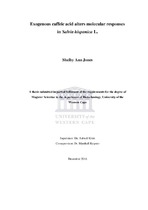| dc.contributor.advisor | Klein, Ashwil | |
| dc.contributor.author | Jones, Shelby Ann | |
| dc.date.accessioned | 2018-04-05T08:07:43Z | |
| dc.date.available | 2018-04-05T08:07:43Z | |
| dc.date.issued | 2016 | |
| dc.identifier.uri | http://hdl.handle.net/11394/5873 | |
| dc.description | Magister Scientiae - MSc (Biotechnology) | |
| dc.description.abstract | Salt stress is one of the most important abiotic stresses, resulting in the
accumulation of ROS, which amount to great agricultural losses by influencing
plant yield and in turn threaten sustainable agriculture and food security worldwide.
ROS accumulates to levels that can become toxic to plants and is dependent on the
scavenging ability of the antioxidant system to maintain redox homeostasis. Caffeic
acid (CA) is a known antioxidant that have been shown to reduce the
formation/production of ROS in legume plants exposed to salt stress. However, its'
effect on pseudocereal plants such as chia have not been elucidated. This study
investigated the influence of exogenous caffeic acid (at a final concentration of 100
?M) on the physiological and biochemical responses of chia plants under salt stress
(100 mM). Furthermore, this study also investigated how caffeic acid and salt stress
influenced protein changes in chia leaves using gel based proteomic analysis
coupled with mass spectrometry. | |
| dc.language.iso | en | |
| dc.publisher | University of the Western Cape | |
| dc.title | Exogenous caffeic acid alters molecular responses in Salvia hispanica L. | |
| dc.rights.holder | University of the Western Cape | |

